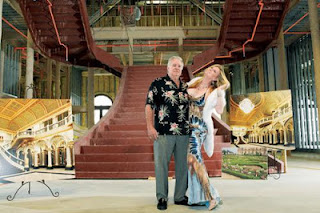A brief primer for anyone not familiar with the Abdication
Crisis of Edward VIII of England: When
he succeeded his father George V as King of the British Empire in 1936 Edward
was technically a bachelor, but had spent several years in the company of
Wallis Simpson, an American socialite. As
their relationship advanced it became clear that Edward intended to marry
Wallis, which was a huge no-go for the monarchy. She was a foreigner and a commoner, she seemed
to share Edward’s more modern views on how the monarchy should operate – namely
by taking a public stance on political matters.
She was also once-divorced and technically still married to her second
husband, which would make marrying her religiously tricky, since among his
other duties Edward was also the Governor of the Church of England. Rumors flew that she had a sexual dysfunction
having something to do with her time spent in “Oriental brothels,” that she had
been involved with men other than Edward during her separation from her
husband, that she was a gold digger, and so forth. After many discussions with Prime Minister
Stanley Baldwin about his options, Edward decided to give up the throne to pursue
his life with Simpson.
Edward
and Wallis did eventually marry, and spent much of their time shuttling back
and forth from America to France and living off an allowance given to them by the
monarchy, and some questionable sales of family real estate. Never one known for his political savvy or
subtlety, Edward made waves during WWII with some remarks that were deemed as
sympathetic to the Nazi regime. Though
he and Wallis both denied that they supported Hitler, it was a black cloud over
their already tarnished reputations for the rest of their lives. From the 1950s on they lived mostly under the
radar.
 |
| Edward & Wallis |
Meanwhile,
Edward’s younger brother Prince Albert became King George VI, a title he never
expected nor wanted. As a child he was
often sickly, easily frightened and had a stammer that followed him into adulthood. Prior to becoming King he had enjoyed a
relatively peaceful and quiet life with his wife Elizabeth and two daughters. Suddenly his family was thrust into the
spotlight during a time of international turmoil and after a major royal scandal. He wrote to Edward that he had taken over “a
rocking throne” and tried “to make it steady again.” Despite the decline of the imperial power of
the United Kingdom and the hard years of the war, under his leadership and by
his example the popularity of the monarchy was renewed.
 |
| George & Elizabeth |
I
know that The King’s Speech won a
bunch of Academy Awards while W./E.
was pretty universally panned by critics and was directed by Madonna. I still think it’s worth seeing both of
them. They offer different points of
view on the same story, and not only by which family member each movie focuses
on; they’re also stylistically opposite one another.
As I said in my original
mini-review, The King’s Speech is
a big, warm, fluffy blanket of a movie. Colin
Firth and Geoffrey Rush are delightful as Edward and his speech therapist,
Lionel Logue. There’s an undercurrent of
desperation to both characters – Edward is about to announce his country’s
involvement in a second World War and must lead with confidence, Lionel quietly
yearns to prove his mettle as a therapist despite his lack of formal
training. HBC is kind of phoning it in
but I love her so who cares. It won’t
make you think, it won’t surprise you, but it’s nice and lovely heart-warming and
soft-focused and comforting.















